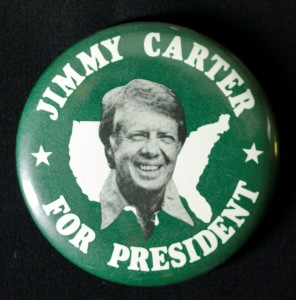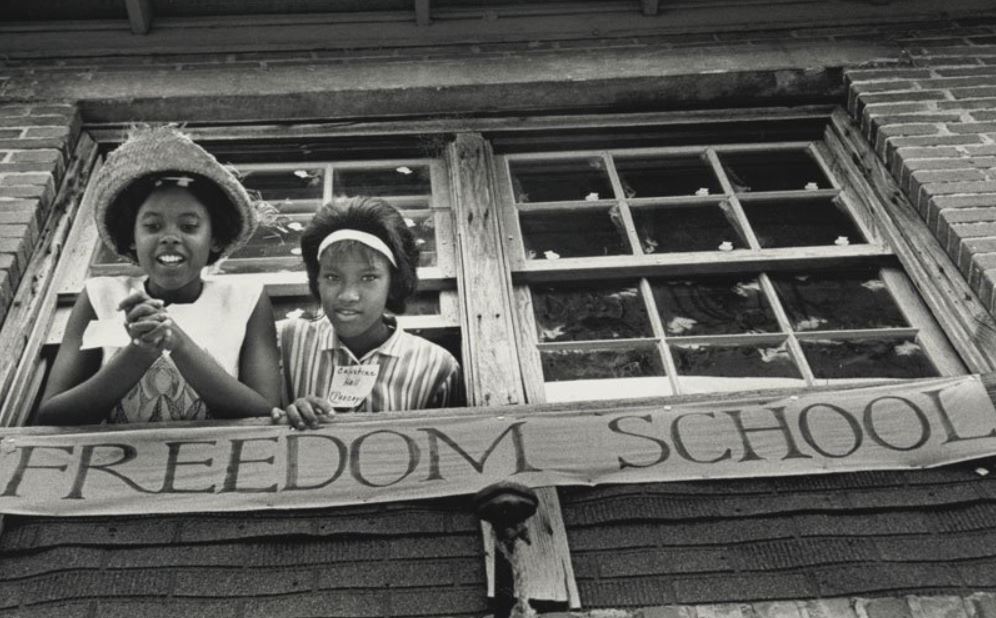
On Sept. 17, 1976, the NEA endorsed Jimmy Carter for president – the first presidential endorsement in the organization’s history. With this endorsement, it joined with the other major teachers union, the American Federation of Teachers, to become a dominant force in the Democratic Party. Image from the Schell Collection.
This is the latest post in our series of the center-left roots of school choice.
Much of the opposition to private school choice seems to emanate from the Democratic Party, but this wasn’t always the case. Just look at the party platforms.
From the 1964 to 1984, the Democrat Party formally supported the public funding of students in private schools.
The 1964 platform stated, “New methods of financial aid must be explored, including the channeling of federally collected revenues to all levels of education, and, to the extent permitted by the Constitution, to all schools.” The 1972 platform supported allocating “financial aid by a Constitutional formula to children in non-public schools.” The 1976 platform endorsed “parental freedom in choosing the best education for their children,” and “the equitable participation in federal programs of all low- and moderate-income pupils attending all the nation's schools.”
Thanks to the influence of U.S. Sen. Daniel Patrick Moynihan, a New York Democrat and devout Catholic, the party’s 1980 platform stated “private schools, particularly parochial schools,” are an important part of our country’s educational system. It committed the party to supporting “a constitutionally acceptable method of providing tax aid for the education of all pupils.” In 1984, the platform again endorsed public funding for “private schools, particularly parochial schools.”
Then the shift began. The 1988 platform was silent on the issue, and by 1992 the Democrats had formally reversed position, stating, “We oppose the Bush Administration's efforts to bankrupt the public school system — the bedrock of democracy — through private school vouchers.”
The party’s current position on school choice was formalized in 1996. That year’s platform endorsed the expansion of public school choice, including charter schools. But it also reiterated “we should not take American tax dollars from public schools and give them to private schools.”
The Democratic Party’s shift from supporting to opposing public funding for low-income and working-class students in private schools can be traced back to an event that also helped spur the growth of modern teachers unions: The 1968 teachers strike in New York City.
This strike pitted the low-income black community of Ocean Hill-Brownsville in Brooklyn against the primarily white New York City teachers union. The issue was whether local public schools would be controlled by the Ocean Hill-Brownsville community or by a city-wide bureaucracy. The union vehemently opposed decentralization since its business model was built around a one-size-fits-all collective bargaining agreement with centralized management.
The strike lasted from May to November 1968. Given school districts are usually the largest employer in most communities, union power quickly grew. (more…)
This is the latest post in our series on the voucher left.
Daniel Patrick Moynihan, Democratic icon, was an unabashed supporter of school choice, as we’ve been happy to note.
For years, he led an effort to establish tuition tax credits for parents who send their children to private schools – an effort that never became law but did, at one remarkable moment in 1977, draw 50 co-sponsors, 26 of them Republicans and 24 of them Democrats. Except for a massive expansion of Florida’s tax credit scholarship program in 2010, which won backing from more than 40 percent of the state’s Democratic lawmakers, no major piece of private school choice legislation that we can think of has drawn that level of bipartisan support.
But while we’ve noted Moynihan’s passion for choice, it’s worth taking a closer look at his rationale. Nowhere does he lay out his case more clearly than in this April 1978 essay in Harper's.
For Moynihan, public support for private schools was a matter of historical fact and constitutional authority, and of being clear-eyed about the well-intentioned but still-smothering effects of government bureaucracy.
It was also about staying true to one of America’s most enduring principles:
I take pluralism to be a valuable characteristic of education, as of much else in this society. We are many peoples, and our social arrangements reflect this disinclination to submerge our inherited distinctiveness in a homogenous whole.
Our private schools and colleges embody these values. They provide diversity to the society, choices to students and their parents, and a rich array of distinctive educational offerings that even the finest of public institutions may find difficult to supply, not least because they are public and must embody generalized values.
Diversity. Pluralism. Variety. These are values, too, and perhaps nowhere more valuable than in the experiences that our children have in their early years, when their values and attitudes are formed, their minds awakened, and their friendships formed. We cherish these values, and I do not believe it excessive to ask that that they be embodied in our national policies for American education.
Moynihan, of course, isn’t the only choice supporter who stressed diversity. Those arguments come from all points on the political spectrum. The Cato Institute makes them frequently and convincingly. So do some academics (see here and here). So does this rising political star, and fellow Democrat, from Moynihan’s home state:
“In every state in this country, we talk about diversity,” New York Assemblyman Marcos Crespo said at a gathering of Hispanic school choice supporters in Florida last year. “We talk about the strength of our diverse communities, we talk about the diversity of faith, of cultures and languages that make the United States what it is, certainly New York what it is. But then we don’t translate that very concept into the way in which we provide opportunities. Ladies and gentlemen, one size doesn’t fit all.”
While Moynihan could be quite the maverick (and an inspiration for decades-long debates), he wasn’t a lone wolf when it came to school choice and the Democrats of his era. (more…)

Despite what the story lines too often suggest, school choice in America has deep roots on the political left, in many camps spanning many decades. Mississippi Freedom Schools, pictured above (the image is from kpbs.org), are part of this broader, richer story, as historian James Forman Jr. and others have rightly noted. Next week, we’ll begin a series of occasional posts re-surfacing this overlooked history.
By critics, by media, and even by many supporters, it’s taken as fact: School choice is politically conservative.
It’s Milton Friedman and free markets, Republicans and privatization. Right wing historically. Right wing philosophically.
Critics repeat it relentlessly. Conservatives repeat it proudly. Reporters repeat it without question.
It has been repeated so long it threatens to replace the truth.
The roots of school choice in America run all along the political spectrum. And to borrow a term progressives might appreciate, the inconvenient truth is school choice has deep roots on the left. Throughout the African-American experience and the epic struggles for educational opportunity. In a bright constellation of liberal academics who pushed their vision of vouchers in the 1960s and ‘70s. In a feisty strain of educational freedom that leans libertarian and left in its distrust of public schools, and continues to thrive today.
This is not to deny the importance of the likes of Friedman in laying the intellectual foundation for the modern movement, or to ignore the leading role Republican lawmakers have played in helping school choice proliferate. But the full story of choice is more colorful and fascinating than the boilerplate lines that cycle through modern media. Black churches and Mississippi Freedom Schools are part of the picture. So is the Great Society and the Poor Children’s Bill of Rights. So is U.S. Sen. Daniel Patrick Moynihan, D-N.Y., and Congressman Leo Ryan, D-Calif., the only member of the U.S. House of Representatives to be assassinated in office.
Perception matters. Perhaps now more than ever. There is no doubt far too many people who consider themselves left/liberal/progressive and identify politically as Democrats do not pause to consider school choice on its merits because they view it as right-wing and Republican (or maybe libertarian). In these polarized times, people have never identified with ideological and party labels so completely, and, I fear, so often made snap judgements based on perceived alignments.
School choice isn’t the only policy realm to suffer from false advertising, but in the case of vouchers, tax credit scholarships and related options, the myths and misperceptions appear particularly egregious. (Note: I work for Step Up For Students, which hosts this blog and administers Florida's tax credit scholarship program, the largest private school choice program in the nation.) The forgotten history means newcomers to the debate get a fractured glimpse of the principles that have long fueled the movement. And it means critics can more easily cast contemporary supporters on the left as phonies or sellouts, as opposed to what they really are: heirs to a long-standing, progressive tradition.
We at redefinED would like to redouble our efforts to change that. So, beginning today, we’re going to offer a series of occasional posts about the historical roots and present-day fruits of school choice that are decidedly not conservative.
We’re calling it “Voucher Left.”
We hope to offer entries big and small, some by redefinED regulars, some by guests. We may rescue a historical document from the dust bin. We may serve up a profile or podcast. Maybe we’ll reconstruct some fascinating but forgotten moments in the rich history of choice, like what happened in California in the late 1970s when a couple of Berkeley law professors tried to get a revolutionary voucher proposal on the statewide ballot. (Here’s a bit of tragic foreshadowing: But for Jim Jones of the People’s Temple, vouchers today might be considered a liberal conspiracy.)
There is no set schedule for the series. We’ll roll out posts as often as time permits, and as often as we can keep digging up good stuff. Look for the first two right after Labor Day.
In the meantime, a few caveats:
We didn’t coin the term “voucher left.” As far as we can tell, all credit goes to writer (and former fellow at the Center for American Progress) Matthew Miller. In a 1999 piece for The Atlantic, Miller used the term to describe the ‘60s era choice camp that included John E. Coons and Stephen Sugarman, Berkeley law professors who co-founded the American Center for School Choice, which helped put this blog on the map. We thought the term perfect – and just as fitting an umbrella for choice’s other progressive pillars. (more…)

In the midst of a Democratic primary for U.S. Senate in New Jersey, Newark Mayor Cory Booker told the Associated Press: "How can we have a democracy in which we create, in a sense, an educational apartheid, where kids born in certain zip codes get great educations and kids born in other zip codes are trapped in schools?"
There’s no doubt many Democrats reflexively give vouchers and charter schools short shrift because of how successfully those school choice options have been branded right-wing. Never mind that school choice has deep roots on the left; that progressive icons like Daniel Patrick Moynihan and Hubert Humphrey embraced tuition tax credits for private schools; that Democratic Presidents Clinton and Obama champion charters. Repeat something long enough and loud enough, and between political tribes and echo chambers, alternate reality begins to wall off the real thing.
Which makes what’s happening in education right now that much more encouraging.
Despite the set-in-stone narrative, more and more Democrats in search of real-world solutions are finding ways around the wall. Since we launched our blog 2½ years ago, we’ve noted many of them. But a good bit of anecdotal evidence suggests the pace of Democratic support is growing. In New Jersey, in the midst of a Democratic primary for U.S. Senate, Newark Mayor Cory Booker didn’t soft pedal when asked about his support for vouchers. In New York, mayoral candidate Anthony Weiner has made expanding school choice the centerpiece of his education platform.
These guys aren’t DINOs. Booker, already touted as a future presidential candidate, once lived on a food-stamp budget to raise awareness about Americans who rely on them. Weiner, before a sexting scandal ended his stint as a U.S. Congressman, was the founder of the Middle Class Caucus and a bomb-throwing lefty darling; he once said during the Obamacare debate that every Republican he’d ever met was “a wholly owned subsidiary of the insurance industry.” To cite the positions of these pols isn’t to endorse them, but to suggest only critics from a detached fringe would consider them corporatistas in Dem drag.
Increasingly, Democrats are seeing school choice for what it really is – not an ideological weapon to be feared, but a practical tool to be honed. We’ve spotlighted other examples on our blog in recent weeks. (more…)
America’s long-running, state-by-state battle over parental empowerment in education may be going national.
In what could be the most far-reaching school choice legislation in U.S. history, Sen. Marco Rubio, R-Fla., is proposing that low-income parents anywhere in the country be able to choose private schools through a federal initiative similar to the tax credit scholarship program in Florida.
“It’s not about unions. It’s not about school administrators,” Rubio told the Miami Herald for a story published Tuesday night - just after he delivered the Republican rebuttal to President Obama's State of the Union address. “This is about parents. The only parents in America who don’t have a choice where their kids go to school are poor parents.”
Rubio is certain to face headwinds in a Democratically-controlled Senate, but the bill he plans to file would give low-income families options in states that have yet to offer them private school alternatives. The fight in many states has pitted teachers unions and school districts against low-income parents who might benefit. And though state constitutions sometimes speak to the use of vouchers, the U.S. Supreme Court has ruled in two separate landmark opinions (here and here) that such programs are constitutional.
Politically, the bill gives Rubio – a potential Republican contender for president in 2016 – a vehicle to barrel into a Democratic vacuum over parental school choice, and to make inroads with black and Hispanic families who increasingly demand such options.
His proposal isn’t a complete surprise.
The Herald notes he called for it during his Senate campaign in 2010. He suggested it again in a December speech at the Jack Kemp Foundation. And as House Speaker in Florida, he helped pave the way for a major expansion of the country’s biggest such program.
The Florida program is funded by corporations that receive dollar-for-dollar tax credits in return for contributions. It serves more than 50,000 students – 68 percent of whom are black or Hispanic - and has won backing from a solidly bipartisan legislative coalition, including a majority of the Legislative Black Caucus. (It’salso administered by Step Up For Students, which co-hosts this blog).
The federal school choice proposal has already garnered the support of three progressive-minded parental choice groups – the Black Alliance for Educational Options, the Hispanic Coalition for Reform and Educational Options, and Agudath Israel, a Jewish advocacy organization. (more…)